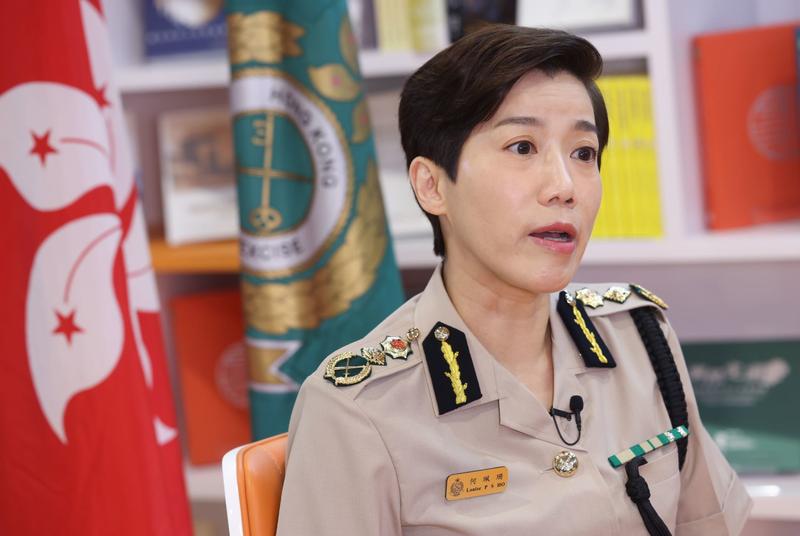 Louise Ho Pui-shan, the commissioner of Customs and Excise of the Hong Kong Special Administrative Region government, gives an exclusive interview to China Daily on Oct 27, 2022. (CALVIN NG /CHINA DAILY)
Louise Ho Pui-shan, the commissioner of Customs and Excise of the Hong Kong Special Administrative Region government, gives an exclusive interview to China Daily on Oct 27, 2022. (CALVIN NG /CHINA DAILY)
The Hong Kong Customs and Excise Department plans to send new hires to the Chinese mainland during orientation training to give them a sense of the nation’s culture, history, regime and situation, and the department’s role in safeguarding national security.
Louise Ho Pui-shan, commissioner of Customs and Excise of the Hong Kong Special Administrative Region, told China Daily in a face-to-face interview that those already working at the department will make similar visits.
Louise Ho Pui-shan, commissioner of Customs and Excise of the Hong Kong Special Administrative Region, said the department have made a raft of initiatives to enhance national security education in and outside the force since the National Security Law for Hong Kong came into effect in June 2020
The mainland visits for both the new hires and veteran employees will take place when the pandemic eases, she said.
Ho said the department have made a raft of initiatives to enhance national security education in and outside the force since the National Security Law for Hong Kong came into effect in June 2020.
ALSO READ: Greener future for finance in HK and Asia, conference told
Education on national security has also been included in the training for new hires. A designated website on national security has been set up for the employees to learn more about it, Ho said.
National security-related materials, such as President Xi Jinping’s speech in Hong Kong on July 1 and the spirit of the 20th National Congress of the Communist Party of China, have been uploaded to the website for officers to study. They will have to pass tests related to the material, Ho said.
The department also set up a “National Security information corner”, which is home to books, photos of magazines about the country’s culture, politics, scientific and economic development.
Externally, the department is also increasing the frequency of Hong Kong Customs College Open Days, to deepen public understanding of national security, as well as the department’s duty and jobs.
The college is also set to open on April 15 — the National Security Education Day every year — in which all the disciplinary forces in the city will make joint efforts to allow the public to have thorough understanding of national security.
ALSO READ: Experts: Blockchain to innovate payment systems
In addition, Hong Kong Customs is taking advantage of high technology to develop smart customs to fend off crimes and enhance efficiency.
Hong Kong Customs promulgated the “Smart Customs Blueprint” in 2019, aiming to build itself into a data-driven department. In June, the Legislative Council gave the department HK$3.4 billion ($433 million) for constructing infrastructure facilities of smart customs, including cloud-based equipment, big data capabilities, and the maintenance of technological security.
“The National Security Law has stabilized the city overall. However, we need to raise awareness to guard against infiltration of ideology. In particular, we should look out for brainwashing items aiming at the youngsters, to prevent the tragedy from reoccurring,” Ho said.
Ho said she believes that the overseas anti-China criminals have changed their ways of doing things by making “soft confrontation”, in which they take advantage of propaganda, including books and publications to mislead youth and induce crimes.
Combatting soft confrontation will require gathering intelligence, Ho said. She pledged that Hong Kong Customs will work closely with other national security-related departments to exchange information. Once anomalies are detected, Hong Kong Customs will take action immediately, Ho added.
Ho also said Hong Kong Customs has also paid special attention to the import of airsoft guns and their accessories, as they may threaten national security after illegal modification.
ALSO READ: Summit welcomes international enterprises, talent back to HK
Hong Kong Customs will strengthen cooperation with the police in this regard. If any suspicious airsoft guns or accessories are found, Hong Kong Customs will ask police to come to the scene and determine whether to take over the investigation, Ho added.
Because of the pandemic, Hong Kong International Airport and borders with the Chinese mainland are not fully open, and the number of smuggling cases involving travelers are fewer. Instead, smuggling cases led by freight transport increase, Ho said.
Criminals may take advantage of the spaces in the cargo to hide smuggled goods, Ho said.
In October 2021, Hong Kong Customs detected a smuggling case by a river trade vessel in the eastern waters of Hong Kong and seized a batch of suspected smuggled goods with an estimated market value of about $1.2 billion. Expensive food ingredients, electronic goods, and scheduled endangered species were hidden in 24 of the containers on board.
As for money laundering, criminals are becoming more sophisticated in using cryptocurrencies. Hong Kong Customs smashed a suspected money-laundering syndicate that used cryptocurrency to process illegal funds to talling HK$1.2 billion in July 2021.
Most cases that relate to customs committed by young people are involved in trafficking illegal drugs and smuggling illicit cigarettes, and crimes by young people show a trend of younger ages and severity of the crimes, Ho said.
Teenage criminals are getting younger and playing more and more important roles in criminal cases. They may be in charge of a drug warehouse, distribute drugs, or hand out telephone numbers for ordering illicit cigarettes in public housing. In a recent drug case, one suspect was only 14 years old.


